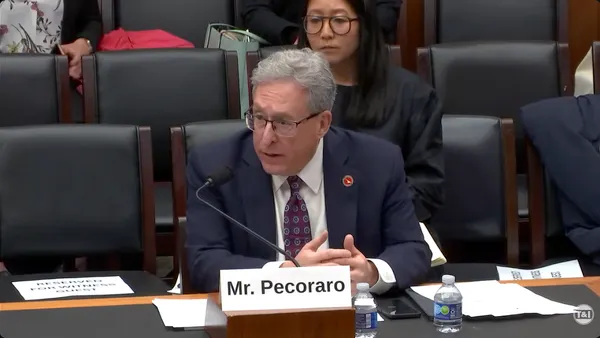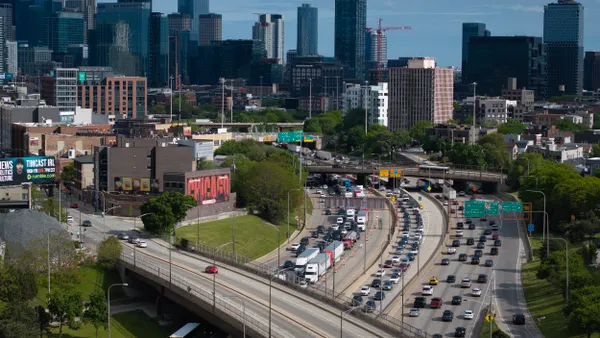In this series, the Smart Cities Dive team will take an occasional look at the practical, logical and down-right genius innovations that are transforming urban centers. Our aim is to ignite a thought or fire up a discussion that impacts the way you perform your job. We can't do this alone; pitch topics, talk to us and help us set the agenda.
A loss turned into a mega-win this year for Kansas City, MO.
While vying for a grant from the Department of Transportation, Kansas City's government officials laid the foundation for a stellar transportation and connectivity plan. Don't take our word for it, check out the application or at least read the executive summary.
The passion, the innovation and frankly, the lively writing in this document clearly helped land Kansas City in the DOT's final seven. But the efforts, based on the Smart City Challenge, instead earned a gold medal in the Edison Awards for Connected Collaboration. Feeling its swagger, the city calls itself the world's most connected smart city. (Apparently this is a distinction that sorely needs a monitor. We told you last month that Atlanta is the most connected.)
The KC plan has multiple goals and the process is not a speedy one. Cisco came onboard about two years ago, helping to form a nearly $16 million partnership to help the city install and implement a two-mile long data collection network along the streetcar corridor. The city-owned data allows people to find parking spaces and monitor traffic. It allows businesses to adjust for increases or decreases in foot traffic. The city can monitor conditions related to its stormwater systems, decide whether to dim streetlights and figure out how best to fight crime.
There are several key takeaways, but one that was eloquently made by CIOReview is central to this success story: Purpose is crucial to the future of smart city development, engagement and adoption. Kansas City's team set an objective to serve its citizens when it embarked on its challenge. This is a big deal for Kansas City, which has its sights set on becoming a 22nd Century City. For cities contemplating the transition from broken to smart, let Kansas City be your guide.
Innovations
-
Alabama's Maxwell Air Force Base is collaborating with AT&T on a security system that uses SIM chips and custom networks to email or text personnel when intruders lurk. This smart base concept can work for the port authority and a host of public government buildings and utilities.
-
The most future-loving, past-hating folks can agree that preserving history is smart, even if it's done through art. Tech-mecca Seattle is careening toward a crossroad, according to a trio of artists. Ghosts of Seattle is its way of holding onto the past as the present and future come crashing in, by drawing maps of old city gathering sites to be displayed around the city.
Two steps forward, one step back
-
Highland Park, MI is not content to have its better days in the past. Facing the challenge of recouping around $22 million in lost retail revenue, improving schools and lowering crime, Mayor Hubert Yopp called for incremental plans to restore the Wayne County city to greatness. A city that once turned out brand new Fords from its plant and was at the forefront of transportation disruption now celebrates getting a few solar lights, yet better days are likely ahead.
-
For all the news about smart trains, data collection and smart transportation, this Japanese train does not fit the bill. It is accessible only for the well-heeled, as the least expensive ride is $3,000 and the most is expensive trip is more than triple that. Check it out here and tell us if you'd like a train like this to make a stop in your city.
Cities in the Smartlight
-
Chicago has ambitious plans, and is going to need deep pocket resources if it wants to move The Imagine Project from proposal to reality. The plan is to develop a smart city in the Bronzeville neighborhood of the Windy City. The location is prime, but the land is undeveloped, says ChicagoInno. It once was the site of the now-demolished Michael Reese Hospital and Medical Center and is a neighborhood with a rich past, as detailed in this podcast produced Laurence Fisburne.
-
Cincinnati is in the early stages of defining and imagining what a smart city looks like, how it operates and what the benefits are — on a regional level. The Smart Cincy Summit held this week brought together executives, government leaders and academic types to think beyond the city concept to come up with initiatives that connect the urban to the suburban.











